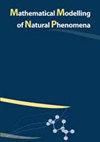基于多项式混沌的流行病模型的有效不确定性量化和方差敏感性分析
IF 2.1
4区 数学
Q2 MATHEMATICAL & COMPUTATIONAL BIOLOGY
引用次数: 2
摘要
将流行病建模用于疾病传播在了解动态和为知情分析和决策提供预测方面发挥着重要作用。在这方面,至关重要的是量化建模和基于模型的预测中的不确定性影响,以可靠地传达结果和局限性。我们建议使用广义多项式混沌(gPC)框架在分区流行病模型中进行有效的不确定性量化。该框架使用合适的多项式基,该多项式基可以根据参数不确定性的基本分布进行调整,通过数学模型通过有效采样进行正向传播,以量化对输出的影响。通过在少量选点中评估模型,gPC以较低的计算成本提供了启发性的统计和灵敏度分析。通过基于丹麦新冠肺炎传播数据的两个特定案例研究,我们证明了该技术的适用性。测试案例考虑了疫情高峰时间估计以及超级传播和部分封锁措施之间的动态。计算结果表明了基于gPC的不确定性量化技术的有效性和可行性,并强调了计算不确定性量化在流行病建模中的相关性。本文章由计算机程序翻译,如有差异,请以英文原文为准。
Efficient Uncertainty Quantification and Variance-Based Sensitivity Analysis in Epidemic Modelling using Polynomial Chaos
The use of epidemic modelling in connection with spread of diseases plays an important role in understanding dynamics and providing forecasts for informed analysis and decision-making. In this regard, it is crucial to quantify the effects of uncertainty in the modelling and in model-based predictions to trustfully communicate results and limitations. We propose to do efficient uncertainty quantification in compartmental epidemic models using the generalized Polynomial Chaos (gPC) framework. This framework uses a suitable polynomial basis that can be tailored to the underlying distribution for the parameter uncertainty to do forward propagation through efficient sampling via a mathematical model to quantify the effect on the output. By evaluating the model in a small number of selected points, gPC provides illuminating statistics and sensitivity analysis at a low computational cost. Through two particular case studies based on Danish data for the spread of Covid-19, we demonstrate the applicability of the technique. The test cases consider epidemic peak time estimation and the dynamics between superspreading and partial lockdown measures. The computational results show the efficiency and feasibility of the uncertainty quantification techniques based on gPC, and highlight the relevance of computational uncertainty quantification in epidemic modelling.
求助全文
通过发布文献求助,成功后即可免费获取论文全文。
去求助
来源期刊

Mathematical Modelling of Natural Phenomena
MATHEMATICAL & COMPUTATIONAL BIOLOGY-MATHEMATICS, INTERDISCIPLINARY APPLICATIONS
CiteScore
5.20
自引率
0.00%
发文量
46
审稿时长
6-12 weeks
期刊介绍:
The Mathematical Modelling of Natural Phenomena (MMNP) is an international research journal, which publishes top-level original and review papers, short communications and proceedings on mathematical modelling in biology, medicine, chemistry, physics, and other areas. The scope of the journal is devoted to mathematical modelling with sufficiently advanced model, and the works studying mainly the existence and stability of stationary points of ODE systems are not considered. The scope of the journal also includes applied mathematics and mathematical analysis in the context of its applications to the real world problems. The journal is essentially functioning on the basis of topical issues representing active areas of research. Each topical issue has its own editorial board. The authors are invited to submit papers to the announced issues or to suggest new issues.
Journal publishes research articles and reviews within the whole field of mathematical modelling, and it will continue to provide information on the latest trends and developments in this ever-expanding subject.
 求助内容:
求助内容: 应助结果提醒方式:
应助结果提醒方式:


